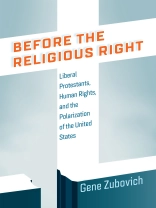When we think about religion and politics in the United States today, we think of conservative evangelicals. But for much of the twentieth century it was liberal Protestants who most profoundly shaped American politics. Leaders of this religious community wielded their influence to fight for social justice by lobbying for the New Deal, marching against segregation, and protesting the Vietnam War. Gene Zubovich shows that the important role of liberal Protestants in the battles over poverty, segregation, and U.S. foreign relations must be understood in a global context. Inspired by new transnational networks, ideas, and organizations, American liberal Protestants became some of the most important backers of the United Nations and early promoters of human rights. But they also saw local events from this global vantage point, concluding that a peaceful and just world order must begin at home. In the same way that the rise of the New Right cannot be understood apart from the mobilization of evangelicals, Zubovich shows that the rise of American liberalism in the twentieth century cannot be understood without a historical account of the global political mobilization of liberal Protestants.
Innehållsförteckning
Note on Translation
Introduction. Global Gospel, American Politics
Part I. One World
Chapter 1. Protestant Political Mobilization in the Great Depression
Chapter 2. The Coming War and the Pacifist-Realist Split
Chapter 3. The World Order Movement
Chapter 4. “A Non-Segregated Church and a Non-Segregated Society”
Chapter 5. The Anti-racist Origins of Human Rights
Part II. Two Worlds
Chapter 6. Beyond the Cold War
Chapter 7. Segregation Is a Sin
Chapter 8. The Responsible Society
Chapter 9. Christian Economics and the Clergy-Laity Gap
Epilogue. Global Gospel, American Fault Lines
Notes
Index
Acknowledgments
Om författaren
Gene Zubovich is Associate Professor of History at the University at Buffalo, SUNY.












